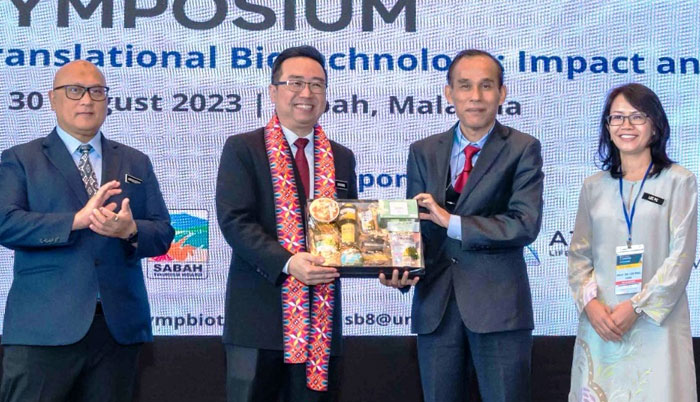![]() Home > Sabah
Home > Sabah
Sabah Offers Treasure Trove Of Genetic Resources

Chang receiving a memento from Professor Dr Rosalam.
![]() August 30th, 2023 | 09:12 AM |
August 30th, 2023 | 09:12 AM | ![]() 914 views
914 views
KOTA KINABALU
Sabah and Sarawak are blessed with abundant biodiversity, which is a valuable source of biotechnology substrate material, said Science, Technology and Innovation Minister Chang Lih Kang.
“They offer a wide range of genetic resources, novel biomolecules and inspiration for innovation, ecological stability, and climate change adaptation strategies,” he said.
Chang also said that Sabah, with her immense biodiversity, offers a treasure trove of genetic resources that can be tapped for various biotechnological applications.
“The state’s rich ecosystems, including rainforests, coral reefs and deep-sea environments, house a plethora of organisms, many of which likely contain unique and yet-to-be-discovered biomolecules. These genetic riches can be instrumental in developing new medicines, agricultural varieties, industrial enzymes and other valuable products,” said Chang when launching the 8th International Biotechnology Symposium (SB8) 2023 at the Sabah International Convention Centre (SICC) on Tuesday.
The central theme of the symposium is “Translational Biotechnology: Impact and Way Forward.”
Chang added that the biomolecules found in Sabah’s biodiversity have properties that are often extraordinary, such as antimicrobial and anticancer activity.
“This potential makes them invaluable assets for drug development and further advancements in biotechnology,” he said.
He also said that Sabah’s well-preserved ecosystems are teeming with diverse microbial communities.
“These microorganisms can have applications in waste treatment, bioremediation and even biofuel production,” he said.
In order to harness these opportunities, he said it is important that Sabah’s natural resources and ecosystems are recognised and utilised to their fullest potential.
“By doing so, not only can a robust biotechnology sector emerge, but it can also contribute to sustainable development and address both local and worldwide challenges,” he said.
In his speech, Chang also shared that the National Biotechnology Policy 2.0 (DBN 2.0) was launched in September 2022 with the objective of strengthening Malaysia’s biotechnology ecosystem.
“The policy focuses on three key areas: agricultural biotechnology and food security, healthcare biotechnology and wellbeing, as well as industrial biotechnology and circular economy.
“DBN 2.0 aims to transform Malaysia into a technological development country by 2030 and has set targets to maintain a global presence for biotechnology companies, empower research institutes, drive economic contribution, foster talent recognition, and encourage bio-innovation. DBN 2.0 also aims to create wealth opportunities through biotechnology related emerging industries contributing to five percent of Malaysia’s GDP (gross domestic product) by 2030,” he said.
At the same time, Chang said his ministry, MOSTI, through Bioeconomy Corporation, is also currently conducting a programme for graduates which is called BioAgrotech and BioPharmaceutical Employability and Entrepreneurship Specialised Training (BeST 2.0).
He said under BeST 2.0, biotech graduates will be placed at host companies in biotech industries, mainly in agricultural biotech and pharmaceutical biotech.
He added that the graduates will undergo training on human capital, technical and work for six months before being offered permanent place at the company.
The number of graduates that has participated in BeST 2.0 and has been hired between 2021 and 2023 are 192 people involving 25 companies, he said.
“This programme managed to prepare the sought after talent that industries need,” he said.
Chang also said in view of the current limitations in funding, human capital and infrastructure, MOSTI has taken the initiative to establish two organisations that play a pivotal role in driving Malaysia’s biotechnology sector.
They are the National Institute of Biotechnology Malaysia (NIBM) and the Bioeconomy Corporation.
NIBM stands as the research and development (R&D) arm of Malaysia’s biotechnology ecosystem, Chang said.
“Among NIBM’s key responsibilities are advancing scientific knowledge, conducting cutting-edge research and nurturing a talented pool of biotechnologists,” he explained.
As for the Bioeconomy Corporation, he explained that it serves as the commercial arm of Malaysia’s biotechnology industry.
“Its primary mission is to nurture and accelerate the growth and development of bio-based companies, thus promoting economic growth, creating job opportunities, and championing the nation’s sustainable bioeconomy development,” he said.
He added that through collaboration with universities, research institutes and industry partners, NIBM and Bioeconomy Corporation address critical challenges and identify new opportunities in various biotechnology domains.
“The biotechnology agenda in Borneo, particularly in Sabah and Sarawak present unique considerations.
This is an aspect that both NIBM and Bioeconomy Corporation should take into account,” he said.
Also present at the launching ceremony was Universiti Malaysia Sabah (UMS) Deputy Vice-Chancellor (Research & Innovation), Professor Dr Rosalam Sarbatly.
The symposium attracted 215 participants, including from Japan, South Korea, India, Pakistan and Indonesia.
Source:
courtesy of THE BORNEO POST
by THE BORNEO POST
If you have any stories or news that you would like to share with the global online community, please feel free to share it with us by contacting us directly at [email protected]